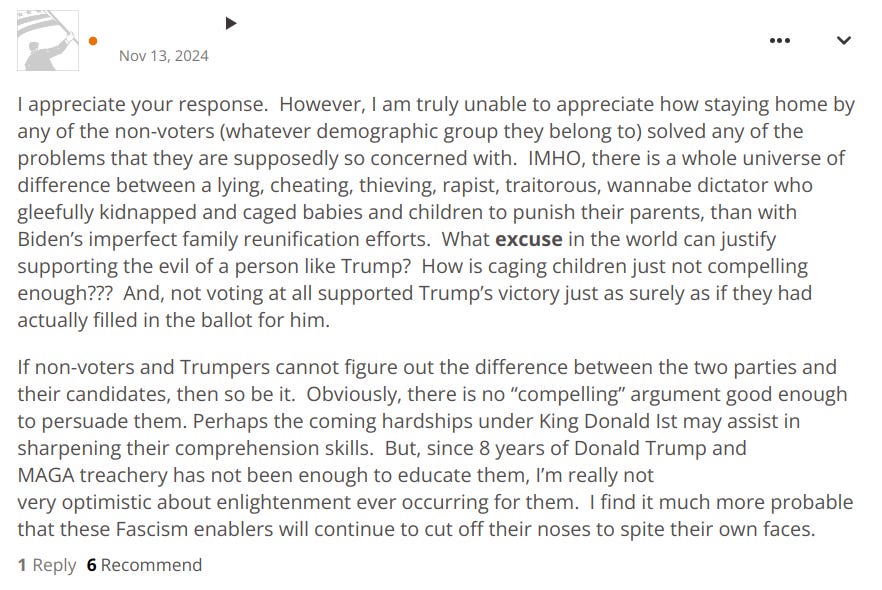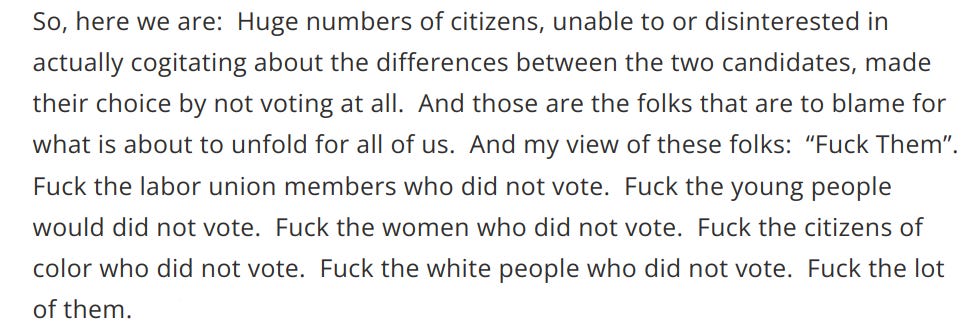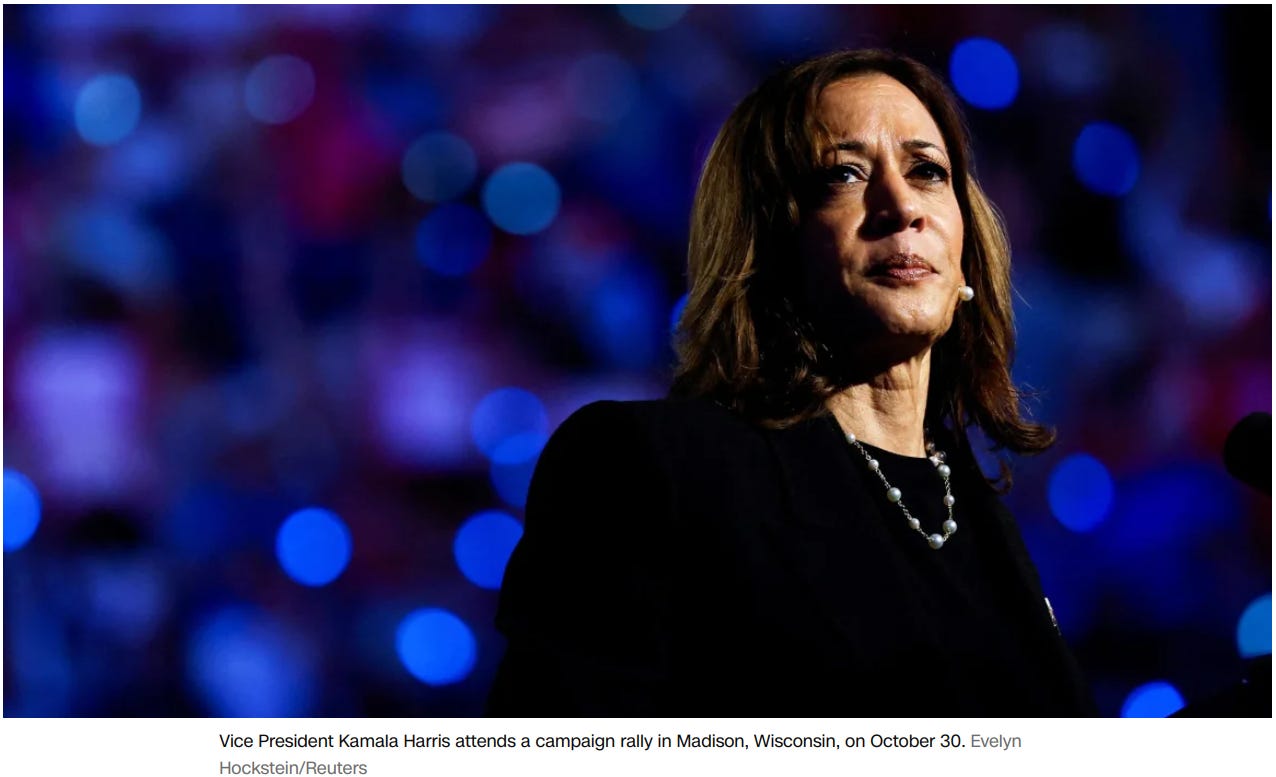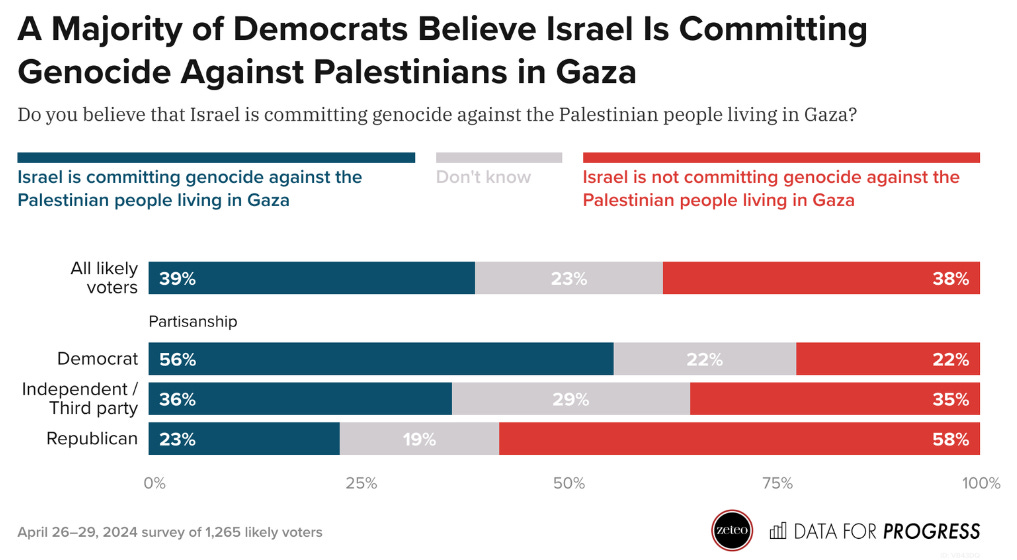Blaming non-voters for Harris's loss? Not so fast
It's really important to slow down and get this right, or we'll be repeating the same mistakes in the future
Nearly a month after the 2024 election, many in the Democratic camp are trying to understand the result. Many had harbored beliefs of a Democratic win, some even projecting a landslide with utter confidence. This rout must have an explanation and, for many, the place to start is by scrutinizing the non-voting population.
“As of Thursday evening, the vote count for Harris was around 68 million, compared to Biden’s 81 million in 2020,” WTOP News reported on November 7. (That number has since been revised to about 74.3 million, still representing about a 7 million vote “shortfall.”)
WTOP added a comment from political science professor John Aughenbaugh of Virginia Commonwealth University, who said, “What really happened was a whole bunch of previous Democratic voters were upset with the Democratic Party.”1
The people looking to blame non-voters for Kamala Harris’s loss are seeking ultra-simple answers. It appears the bulk of these folks are looking for a scapegoat.
Some complain of voter apathy.


These people don’t realize that, in this election cycle, the emotion affecting many Democratic non-voters — those who had voted Democratic in the past, perhaps their whole lives, but had declined this time — was demoralization, not apathy.
The problem with this tendency to bundle all non-voting, categorically, as a symptom of apathy is that it blinds one to truly analyzing all of the moving parts of this election.
Undoubtedly, some of those non-voters were, paradoxically, some of the most engaged and most informed voters. We know that more than 50% of self-identified Democrats considered Israel to be committing genocide in Gaza — and that poll was taken back in April. Chances are that number has grown.
The more that Democrats — Harris included — made it clear that they would keep that genocide supplied and active, the more demoralized these particular voters became. In the end, many stayed home.2
That’s different from the factors affecting the (stereo)typical “low-information voter.” Indeed, Gaza voters were probably on top of the news cycle, gathering information from a plethora of sources, and involved in contacting their senators and representatives.
Low-information voters,3 by contrast, are seen as marginally aware of the minutiae of politics, swayed more by personality and the day’s drama than policy on a broad scale, and are consumed by the demands of their everyday environment. Maybe they work two jobs or are going to night school. Maybe they’re taking care of a sick relative. Maybe they’re a single parent trying to balance their schedule. Or maybe they are just unaware of how politics, through policy, actually affect their lives. And so they don’t pay attention.
That’s a completely different set of motivations (or, as one would have it, de-motivations). Thus the interventions must be different. This is vitally important to understand, because without this level of nuance the lessons of this loss will not be learned.
Another thing these blamers need to consider is that even if these non-voters were activated, there’s no guarantee that they would have voted for Harris. This is an example of magical thinking, that if we had roused these folks sleeping on their feet that they all would have stampeded in the Democratic direction. This way of thinking is dangerously simplistic.
About one-third of the American voting populace didn’t vote. That’s standard. Political scientists have puzzled over this phenomenon for decades, trying to come up with ideas to increase not just turnout (which might be a mechanical exercise for those compelled to vote by law) but enthusiasm, the desire to vote for one party or another.4 It does Democrats no good to attempt to blame Harris’s loss on this chronic bloc of ghost voters. They were never going to vote. Harris could not count on them to vote. She needed to activate her own base.
So to learn the lessons of the loss, Democrats need to reconcile their own shortcomings as a party with those voters who have previously voted Democratic but this year declined to do so. That reconciliation is going to take time and care, because that group of voters is not a monolith. Some stayed home because of demoralization, others out of apathy; some cast a “protest” vote for a third-party candidate; and others completely crossed over to cast a vote for the Republican ticket. Democrats cannot treat these voters the same if they want to figure out how to attract their vote.
This comment by Aughenbaugh is undoubtedly true. Yet, as I’ve said before, Harris’s loss was multifactorial. This essay should not be considered a full-fledged post-mortem but is rather limited to deconstructing — at least in part — this fallacious tendency to want to condemn all non-voters for the Democratic outcome.
In an interview with Dean Obeidallah, Gen-Z activist Dylan Douglas noted, “Us kids were very connected. So when it comes to issues like, for example, Palestine, where not my entire generation had an opinion on it or were even clued in on what was going on, if you have an undercurrent, particularly in youth spaces like universities, of dissatisfaction with the incumbency, that’s going to really drive turnout down, I think, among a broader generation.” He continued, “What I’m trying to get at is, even removed from any of the sort of emotional or real issues surrounding the ongoing war, when you’re living in a campus environment or any sort of larger circle where there’s any sort of dissatisfaction in a liberal space, I think that resonates with people. It sort of has a domino effect, even to people that aren’t even attached in any way or know of the issue.”
Douglas’s observations mirror the concerns I raised months ago, where I noted that in Michigan the Uncommitted vote, which was ~ 13% statewide, registered at 19% in the liberal stronghold of Ann Arbor, where the University of Michigan is located. As I said at the time, the results were a flashing indicator.
Jennifer Rubin, opinionist at the Washington Post, recently dedicated a full column to the problem of reaching the low-information voter. “Democrats might pine for a country of high-information voters fostered by civics education and responsible social media platforms that elevate truthful policy statements. However, they shouldn’t hold their breath,” Rubin advised. “Even if those efforts might make a difference at the margins (more likely improving the acuity of already-informed voters), the mass of low-information voters will remain happily oblivious to policy and political details.”
See, for example, Taeyong Kim’s “Discriminant Analysis as a Prediction Tool for Uncommitted Voters in Pre-Election Polls” (International Journal of Public Opinion Research (1995), Vol. 7, No. 2). This problem of a standing cohort of uncommitted voters should have been accounted for in the Harris campaign. This election cycle had the added factor of the fact that a subpopulation of the uncommitted voters had actually declared beforehand that their reluctance was based on one issue. So, in this case, the Democratic Party had what normally would be hidden information. The party simply chose not to interpret correctly the message that was being sent to them (as evident in President Biden’s response to the first Uncommitted result in the Michigan primary in February). If this is true, then it is as if the party just didn’t include those voters in their analysis at all; or, worse, they treated them as though they would vote according to their past party affiliation. That would have been a fatal mistake, as the campaign’s voting forecast would be skewed.






Can you imagine what an affront it was to Palestinians and pro-Palestinian anti-genocide folks to see Kamala supporting the funding and arming of Israel and campaigning with a theme of 'joy'? It's beyond insensitive.
"These people don’t realize that, in this election cycle, the emotion affecting many Democratic non-voters...was demoralization, not apathy." Well put and dead on!
I praise your continued deconstruction of these event's. And I know that your words are true. However, the more time I spend on such considerations the less fruitful it becomes, when I all ready know that the two "traditional" parties at the national level have long ago forfeited any ability to lead or guide us. We must think of our nation and the world it inhabits in a new light. Both parties give unflinching support to the predatory capitalist elites expansion policies. They are literally "killing" us!
Consider this information from my friend- Jack@veprjack, Jack's newsletter at Substack.com-
"Desmet's work on Mass Formation (Psychosis ) has helped me understand the insane behaviors we are witnessing. I'm told that people have committed suicide because Trump won. Let that sink in!"